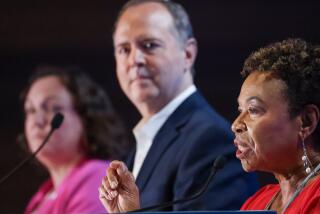With Bentsen, Dukakis Wisely Bolsters the Center and Gains a Real Insider
- Share via
In his account of the 1976 presidential nomination contest, journalist Jules Witcover described the efforts of Texas Sen. Lloyd Bentsen to achieve name recognition as a struggle to avoid being introduced to audiences as “Floyd” Bentsen.
Bentsen, a dignified but colorless former insurance man, never succeeded in having people get his name straight, and ended up being the first victim of the winnowing process of the 1976 campaign.
Knowing only this part of Lloyd Bentsen’s history, one might be inclined to doubt the wisdom of Michael S. Dukakis’ choice of the Texan as a running mate. How would this 67-year-old Tory Democrat, best known for his prodigious feats as a fund-raiser, benefit the self-proclaimed party of the people and its low-keyed likely nominee? At first glance it would appear that Dukakis had mysteriously resolved to duplicate all of his shortcomings and take on the additional burden of a plutocrat as a running mate. But, as the initial shock wears off, the political astuteness of Dukakis’ decision becomes apparent.
As a political gesture to the key state of Texas, the choice of Bentsen is sensible. The senator’s credentials as a son of this state with its 29 electoral votes are even better than Vice President George Bush’s. Bentsen is native to the Rio Grande Valley area of south Texas, where his father, “Big Lloyd” Bentsen, came in 1921 to establish a ranch. In Texas terms Bush is a Johnny-come-lately who did not migrate to the Midland-Odessa area until after World War II. Bentsen, moreover, is one of the giant-killers of Texas politics. He not only humbled Bush, then a member of Congress, in the 1970 Senate race but six years later turned back a challenge from Rep. Phil Gramm, now his junior colleague.
Bentsen is no casual participant in Texas politics, either. He comes from the conservative wing of the state’s Democratic Party and embarked on his Senate career with a primary election victory over the liberals’ hero, Sen. Ralph Yarborough. That alone might have gained him the eternal enmity of the Texas Democrats’ left wing, but he has managed over the last 20 years to enjoy the support of black and Latino voters who normally are not enthusiastic over candidates of Bentsen’s philosophical stripe.
Bentsen brings an element of reassurance to the ticket. It is not, perhaps, so important as the role played by Lyndon B. Johnson on the ticket headed by Massachusetts Sen. John F. Kennedy in 1960, but it will go far to bolster the loyalty of some Democratic centrists who feared Dukakis as a crypto-radical.
If the Democrats gain the White House in November, Bentsen will be a major asset for Dukakis. Many in Congress fear that the Massachusetts governor might be another Jimmy Carter, but Bentsen is the consummate Senate insider. George Bush would have to go for Sen. Bob Dole of Kansas to match the congressional experience of Bentsen. The Texas senator has developed the reputation as a deal-maker of great skill. While he is the furthest thing from a protectionist, he collaborated with Rep. Richard A. Gephardt of Missouri on a tough trade bill in order to put a shot across the bow of the Japanese and induce them to open their markets to American products.
To characterize Bentsen as a suave tactician would be too simple, even though both his suavity and tactical sense are very much on display. While he undoubtedly feels most at home with legislative manipulations in Washington and the rough-and-tumble politics of Texas, Bentsen is no L.B.J. Bentsen deals in substance, not just political expediency. He used his chairmanship of the Joint Economic Committee with great creativity. His well documented love of tax cuts as a stimulus to the economy, which he championed on the committee, can be used as an amulet by Dukakis to ward off the big-spender tag that Bush is hankering to hang on the Democrats.
It was from the brainy staff of the Joint Economic Committee that Bentsen chose his principal political aide, Michael Levy, a product of Johns Hopkins and Rutgers who taught at Texas A&M; and feels as comfortable discussing philosopher John Rawls as he does the sheriff’s election in Brazos County. Bentsen’s credentials as a national Democrat moreover are helped by the fact that he was never a conspicuous member of the boll weevils, the mostly Southern group of Democrats during the first Reagan Administration who always took a malicious delight in bashing the more liberal members of their party. Indeed, Bentsen once described himself as a “Harry Truman Democrat”--a tag that makes him no enemies.
The man chosen by Dukakis is not easily pigeon-holed. He is a friend of bankers who voted for legislation dear to the hearts of organized labor. He is a man whose very lack of flamboyance makes it hard to view him as a fat cat or wheeler-dealer. He is also that rare politician who can blunder, make amends and move on.
Dukakis might have selected a more colorful politician as a running mate, buthe could not have come up with one more self-possessed and confident as the man once referred to as “Cool-Hand Lloyd.”
More to Read
Get the L.A. Times Politics newsletter
Deeply reported insights into legislation, politics and policy from Sacramento, Washington and beyond. In your inbox twice per week.
You may occasionally receive promotional content from the Los Angeles Times.










